When it comes to playing karuta, in the end, it all comes down to the fastest player with precise, calculating movements. One critical skill for karuta is hearing, as players must go for a matching card upon the certified reader’s rendition of the karuta card drawn out. As hearing is very important, the reader must take care to recite the poems with care and timing so as not to interrupt the flow of a karuta match, and thus the reader is critical to karuta.
Hisashi Suo, the reigning Master of karuta, gave a splendid display of his swift movements, overwhelming his opponent with ease. When interviewed, he had this to say about his sweet karuta cards; for him, there are 28 one-syllable cards for him including the real 7 one-syllable cards. This means a greater chance of successfully matching a card with the reader’s drawn card. How did he achieve this rate, one might wonder? For him, it’s all about how the reader recites the poem. Even if one syllable has the same phonetic sound, the nuances of the reader’s emotions and image of the poem will carry in the recital. This is poetry, a timeless art.
Poets expresses themselves through timeless words. Not only do they just compose and write poems, they also have to consider the rhythm of the poem for them to recite. It is important to be able to give emotions to these poems, else they become mere words. And over time, their history begins to become meaningful as well, as is the case for the anthology of all 100 poems used in karuta, also called Hyakkunin Isshu. Hyakkunin Isshu is an anthology of 100 poems composed by 100 poets compiled by Fujiwara no Teika, a poet and scholar of the late Heian and early Kamakura periods. Also often called Ogura Hyakkunin Isshu, it is said that in one of Teika’s diaries, his son asked him to arrange one hundred poems for his father-in-law, who was furnishing a residence near Mount Ogura. For Chihaya, her sweet card is poem 17, one of the most famous and recognizable poems in Hyakkunin Isshu.[1] The history and interpretation of the Hyakunin Isshu is quite fascinating and well worth exploring for anyone interested in karuta, or the anime, Chihayafuru.
As for karuta itself, I have to admit that reciting the poems appeal to me far more than sitting on the tatami mats and swiftly capturing the cards.[2] This may be because I simply wouldn’t be able to play karuta as easily as most people due to my loss of hearing. However, I can still speak well enough, thanks to speech therapy. Plus, Japanese has a simpler phonetic system than English. Japanese has a smaller inventory of sounds, compared to English with a much larger inventory of sounds and nuances. Japanese has 5 pure vowel sounds, and the syllable structure is simple, generally with the vowel sound preceded by one of about 15 consonant sounds. This is partly the reason how Engrish come into being; Japanese learners of English sometimes have difficulty pronouncing the nuances in English that are not pronounced in Japanese, such as strength, Christmas, hot dog, etc.[3]
Chihayafuru ends off on a good note, and I’ve enjoyed watching it very much. Let’s hope there’s a second season, and in the meantime, I have a treat for you! Here is a poem from Hyakkunin Isshu that I’ve taken a liking to for its clever Japanese wordplay and images of nature.[4]
吹くからに Fuku kara ni
秋の草木の Aki no kusaki no
しをるれば Shiorureba
むべ山風を Mube yama kaze o
あらしといふらむ Arashi to iuran
Translated to English:
As soon as it blows,
the autumn trees and grasses
droop, and this must be why,
quite rightly, the mountain wind
is called “the ravager.”
I wonder if there’s another way to become a certified reader that doesn’t involve becoming and staying as a Class-A player for 5 years…
- Here’s the original and translated poem by Ariwara no Narihara. This blog is an ongoing translation attempt for all 100 poems, so it’s worth checking out!
- SnippetTee’s post on body movement in karuta.Though I must admit that I’d like to be able to capture a card swiftly and smoothly. That’d be very handy. ^^
- I can certainly relate to this, though in my case, I am deaf. I usually have trouble with those accursed silent sounds (“th”, “s”, “z”) in English.
- A translation and interpretation of the poem by Fun’ya no Yasuhide.
- Chihayafuru now has the prestigious honor of becoming my 300th completed anime. ^^

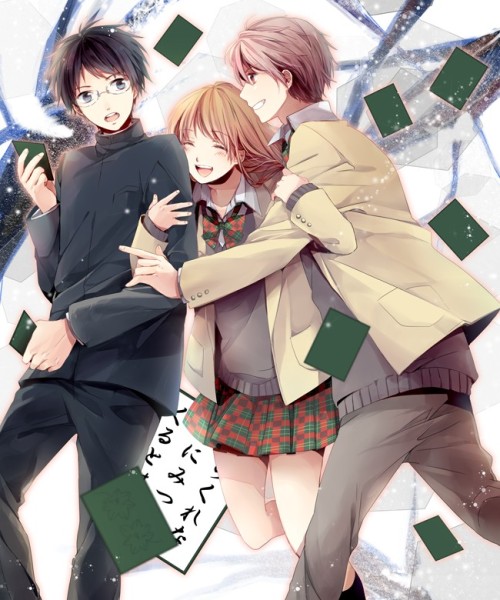
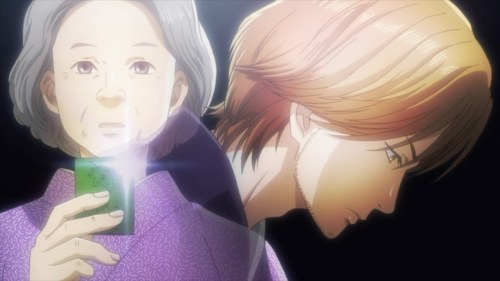
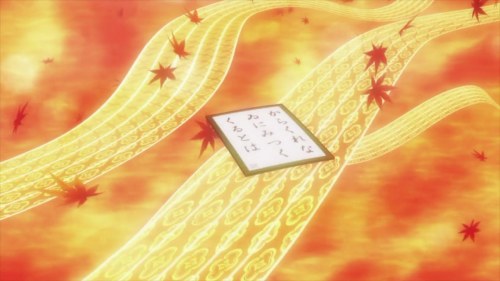
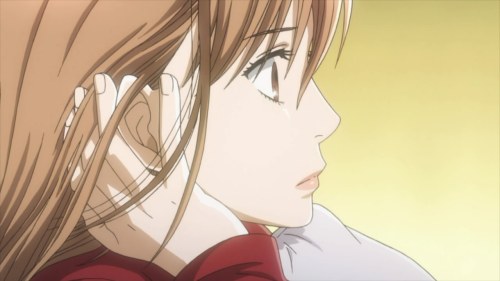
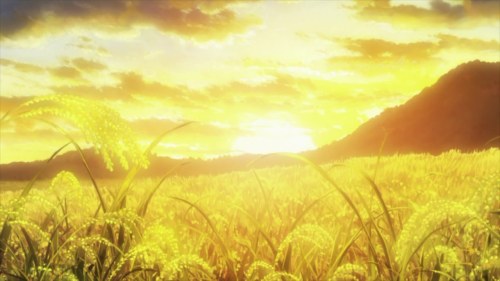



Reading this, I think I have a good idea which character you identified with the most.
The sign of a good sports anime, even a shojo one, is that you walk away with a deeper understanding of the game and the nuances in it. Even if I were to watch real world Karuta, I never would have understood the games or the poems based off of it like I do now. I’m still not sure what the poems actually say, but this got me more interested in poetry than I’ve been in a long time.
I’ve actually never watched much sports anime, but I do agree with you about learning something about the game. In real life, it can seem boring, but anime really brings out the essence of the game to show its good side. If you’re ever interested in wanting to know about what the poems say, you can always visit the blog I mentioned in the footer. ^^
“For him, it’s all about how the reader recites the poem. Even if one syllable has the same phonetic sound, the nuances of the reader’s emotions and image of the poem will carry in the recital. This is poetry, a timeless art.”
I wonder, if that really happens in reality- discerning from emotion. Then these would be the ears of God…
Nice post!
Oh, I think it might be possible. Take for instance this sentence: “I love you.” There are several ways to express this sentence, like as if one is speaking as a friend (in a fun way), a family relative (in a supportive way), or a lover (in a romantic way). Well, that’s what I’d imagine in my mind and I can’t really tell the difference in real life. ^^
Thanks!
I understand your example, yet when it comes to karuta reciting, the phrases sound pretty monotonous,as I perceive it at least. Since they recite to a certain rhythm and should not raise or lower their voices… plus it seems to me miraculous to be able to ‘see’ the image the reciter has in mind… is that telepathy or something?
(I hope I didn’t make you akward with my comments…)
Oh, I see where you’re coming from with regard to reciting the poems for karuta players. That’s true, it would be quite miraculous to be able to see the image so quickly from the very moment the syllable is uttered. I’d think that a better term for this would be “game sense”, where one become very aware and focus on the game instead of technique practice. That would be quite a feat. ^^
(Don’t worry about it! It’s not awkward at all. :))
I’d heard of Karuta before, but I never really knew what it was about until now! It certainly seems interesting, just like this anime! I probably wouldn’t have given this anime a second glance without your post, but now I am really eager to watch this!
Great! Chihayafuru is a fun shoujo sports series to watch, and the characters are quite likeable. I hope you’ll enjoy this series as I have. ^^
Oh, and it’s nice to see a new face around here!
Pingback: Aniblog Stuff Day 3
i want i love karuta
i want to try playing karuta
i luv chihaya furu its inspired me to karuta i’m lookin forward 2 enjoy it
Very interesting article. Have you found any English resources for reciting tanka poetry in proper form (there seem to be conventions like drawing out the last line of the first verse, for example). I’ve started playing karuta with some people at my university and we’ve been relying on reading software. It would be great to be able to read properly, though, and not just parrot one recording or another.
Sorry for the late reply! I haven’t found any English resources for recitation, since I’ve been busy lately. But using reading software sounds interesting! Also, for future reference, I’ve moved my blog over to http://www.ephemeral-dreams.com/, so you might want to check for any updates over there. 🙂